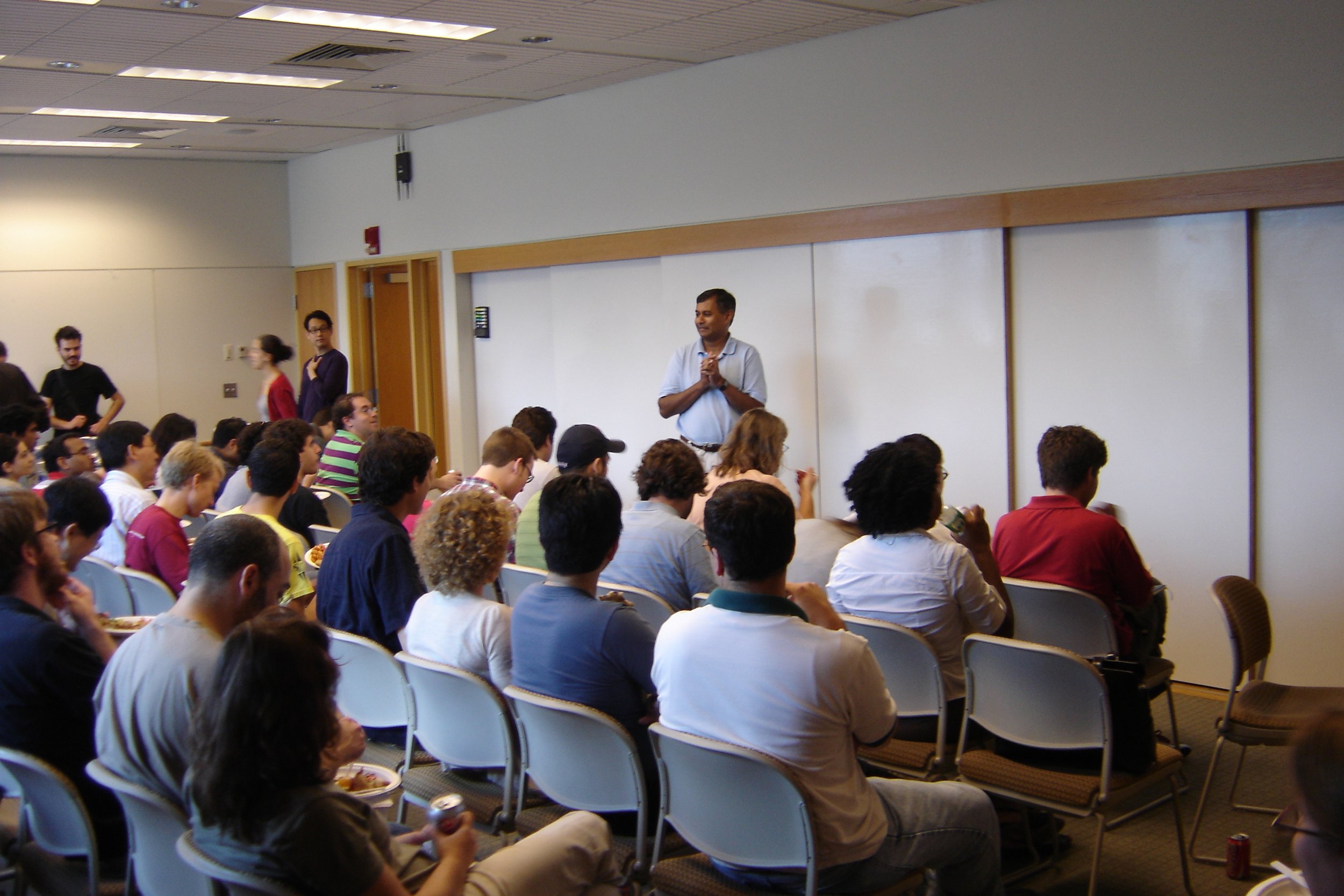Upcoming Events








Monday Department Seminars: Systems Seminar w/ Michael Levin (Tufts University)
Talk Title: "Endogenous Bioelectrical Signaling as a Coordinator of Multiscale Morphogenesis: left-right asymmetry, regeneration, cancer, and beyond"

Monday Department Seminar: Systems Seminar w/ Cameron Myhrvold (Princeton University) "CRISPR-based technologies for studying RNA"
Abstract: CRISPR-Cas9 has transformed our ability to study DNA by manipulating genomic information in a programmable fashion. The RNA-targeting CRISPR effector protein Cas13 is poised to revolutionize the study of RNA in a similar fashion, with numerous applications in RNA knockdown, detection, editing, and imaging. To fully realize the potential of Cas13 as a platform technology to detect and manipulate RNA, we need a better understanding of how target sequence and structure govern Cas13’s ability to detect and cleave RNA. To address this key challenge, my lab at Princeton is developing a diverse set of programmable Cas13 tools and technologies for studying RNA in vitro, in cells, and in vivo. These include technologies for detecting viruses and bacterial pathogens, and for profiling the immune response to infection. We also are developing technologies for RNA imaging and perturbation in eukaryotic cells. In addition, we are investigating the molecular mechanisms by which Cas13 can target RNA so that we can further enhance its programmable RNA-targeting properties. We are applying these technologies to answer an array of biological questions that have major implications for human health. Our interests span infectious diseases and human genetic diseases, many of which are associated with RNA dysregulation or mutations in RNA-binding proteins.

Monday Department Seminars: Systems Seminar w/ Arjun Raj (University of Pennsylvania) Embroyonic Economics
Title: Embryonic Economics
Abstract:
The traditional view of embryonic development is that of a highly orchestrated symphony, where everything is under the control of a conductor. Another view, however, is that development arises from the cooperative behavior of quasi-independent agents. We demonstrate that cells in early embryonic development, as modeled by gastruloids, can behave as independent agents with their own predispositions. We show that this heterogeneity is beneficial to proper development via individual clones displaying division of labor. We further show that cells display comparative advantage, with clones sometimes adopting unfamiliar roles in the service of the greater good. Together, these results provide a basis for the concept of cellular individuality during development, guided by principles taken from economics.





Theory Lunch Stephanie Palmer "Which part of a visual system should evolution modify first?”
Which part of a visual system should evolution modify first?
Please note that Stephanie Palmer will be presenting virtually via Zoom.
Stephanie Palmer: Dept of Organismal Biology & Anatomy | University of Chicago

Theory Lunch Francis Corson "How cells agree on making an embryo” (Copy)
How cells agree on making an embryo
Please note that Francis Corson will be presenting virtually via Zoom.
Francis Corson: Laboratory of Physics | Ecole Normale Supérieure, FRANCE
Abstract
Embryos are remarkably adept at developing towards a functional form in spite of perturbations. Take an early avian embryo and cut it in half, and you will get two fully-formed embryos. Drawing from examples like this one, which we have found to involve mechanical feedback, I will discuss some of the ways that cell-cell interactions can support self-organization, and ask whether we should think of the form of an embryo as a consensus among its parts.

Theory Lunch Ivana Bozic "Evolutionary dynamics of cancer"
Evolutionary dynamics of cancer
Please note that Ivana Bozic will be presenting virtually via Zoom.
Ivana Bozic: Department of Applied Mathematics | University of Washington
Abstract
Cancer results from a stochastic evolutionary process characterized by the accumulation of mutations that are responsible for tumor initiation, progression, immune escape, and drug resistance, as well as mutations with no effect on the phenotype. Mathematical modeling, combined with clinical, sequencing and epidemiological data, can be used to describe the dynamics of tumor cell populations and to obtain insights into the hidden evolutionary processes leading to cancer. I will present recent approaches for quantifying the evolutionary dynamics of cancer in patients, and their implications for deciphering cancer heterogeneity and response to therapy.

Monday Seminar | Kotaro Fujimaki
On Zoom and in WAB 563
Monday Seminar: Kotaro Fujimaki, Lahav Lab
Talk Title: DNA damage checkpoints balance a tradeoff between diploid- and polyploid-derived arrest failures

Theory Lunch with Benjamin Allen "Is it time to stop fighting about cooperation?"
Is it time to stop fighting about cooperation?
Benjamin Allen | Emmanuel College, Boston
Abstract
The evolution of cooperation has been a major question in evolutionary theory since Darwin. It has also been the focus of intense disputes over the merits of different methodological approaches. I will review the four major theoretical approaches to the evolution of cooperation: multilevel selection, inclusive fitness, population genetics, and evolutionary game theory. Crucially, these approaches differ in the level at which the explanation applies, and in how they relate to the notion of "actor". I will examine the question of whether these are mathematically equivalent, and critically evaluate previous claims of such equivalence. I will then outline a new mathematical approach to the evolution of cooperation and other social behavior, which synthesizes and extends the four existing frameworks. In this new approach, the notion of "actor" is extended from individuals to collectives, and the outcome of evolution reflects an aggregation over individual and collective interests across scales.


Theory Lunch with Saad Bhamla "Movement sans ATP and learning sans neurons in curious ciliates"
Movement sans ATP and learning sans neurons in curious ciliates
Please note that Saad Bhamla will be presenting virtually via Zoom.
For those who prefer to gather in person, WAB 563 will be available to watch the talk together.
Feel free to bring your own lunch and join us! 😊
Saad Bhamla: School of Chemical and Biomolecular Engineering | Georgia Tech
Abstract
Tangled active filaments are ubiquitous in nature, from chromosomal DNA and cilia carpets to root networks and worm collectives. How activity and elasticity facilitate collective topological transformations in living tangled matter is not well understood. In this talk, I will share our discoveries on why aquatic worms braid, tangle, and knot with their neighbors to form extraordinary mechano-functional living blobs — the stuff of science fiction. I will discuss how these soft, squishy, and 3-D blobs rapidly morph their shape, crawl, float, climb, self-assemble, and disassemble topological tangles. Using both mathematical models and robotic analogs, I will discuss how these "living polymers" solve Gordian knot problems using clever biophysics mechanisms that open a path to new classes of active topologically tunable robotic swarms.


Theory Lunch Lucy O'Brien "How flux through the cell lifecycle enables organ adaptation"
How flux through the cell lifecycle enables organ adaptation
Lucy O'Brien | Dept of Molecular and Cellular Physiology at Stanford University School of Medicine
Abstract
Forthcoming

Theory Lunch with Andrea Liu "Complex biological function as an inverse input-output problem"
Complex biological function as an inverse input-output problem
Andrea Liu | Dept of Physics and Astronomy at Univ. of Pennsylvania School of Arts & Sciences
Abstract
In neural networks, parameters that govern interactions between nodes are tuned to obtain desired input-output relations. I argue that it is useful to think of systems with biological function as having effective interactions that are tuned to achieve the biological function. Such systems can be viewed as members of a large class of systems that I call "tunable matter." In some cases, biological evolution has tuned the interactions, but in other cases, systems tune their effective interactions by local rules in order to maintain function on time scales much shorter than evolutionary ones. I argue that tunable matter provides a unifying conceptual framework for understanding the emergence of collective function in a wide range of living systems.



Theory Lunch with Leonor Saiz "The reasonable and unreasonable effectiveness of equilibrium statistical mechanics in gene regulation"
The reasonable and unreasonable effectiveness of equilibrium statistical mechanics in gene regulation
Leonor Saiz | Department of Biomedical Engineering at UC Davis
Abstract
Gene regulation exemplifies a duality wherein equilibrium statistical mechanics effectively describes quasi-equilibrium behaviors, yet systems maintain functionality under significant perturbations. Time scale separation facilitates quasi-equilibrium conditions, enabling predictive modeling of regulatory mechanisms. However, the persistence of regulatory function during substantial disturbances, such as DNA replication, challenges equilibrium assumptions. This robustness can emerge from compensatory mechanisms, such as transcription factor coordination and DNA modifications, that mitigate transient non-equilibrium effects. This talk will examine how these strategies complement quasi-equilibrium dynamics, revealing the strengths and limits of equilibrium models in explaining gene regulation resilience.

Theory Lunch with Steven Orzack "Science needs philosophy, but what philosophy?”
Science needs philosophy, but what philosophy?
Abstract
Forthcoming
